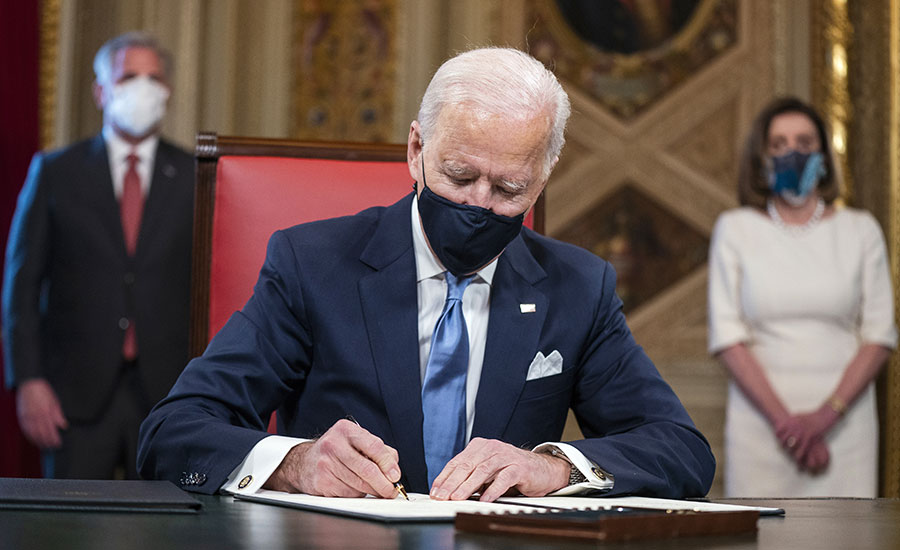Construction projects could be impacted by the review and possible rollback of more than 100 regulations that face scrutiny under a day 1 executive order signed by President Joe Biden. But industry officials say such reviews are par for the course, and are withholding judgment on any potential changes until they actually happen.
Under the executive order, Biden is directing executive departments and agencies to “immediately review and take appropriate action to address federal regulations and other executive actions taken during the last four years that were harmful to public health, damaging to the environment, unsupported by the best available science, or otherwise not in the national interest.”
The administration also issued a regulatory freeze memo on Jan. 20—ordering agencies to stand down on any ongoing rulemaking.
Some of the regulations tapped for review include the recently finalized and modified Army Corps of Engineers Nationwide Permits for project impacts to water bodies; revisions to endangered species regulations; the Navigable Waters Protection Rule, otherwise known as Waters of the U.S.; several energy efficiency standards; revisions to the lead and copper rule related to drinking water levels; dust-lead abatement levels; ozone standards; coal ash management rules; oil and gas leasing reforms; and vehicle mileage standards.
The administration notes that more regulations could be added to the list.
“We were in favor of many of the regulatory reforms,” that were put in place by the Trump administration, says Nick Goldstein, vice president of environmental and regulatory affairs for the American Road & Transportation Builders Association (ARTBA). “And we will certainly evaluate and offer our comments on any changes.”
Goldstein says that Biden’s actions are not a surprise, and are taken by most incoming administrations of a differing political party.
“There’s nothing too surprising [on the list] given the priorities of the incoming administration,” he says
Several of the rules tapped for examination, including changes to the National Environmental Policy Act, have been made too recently to have been implemented on jobsites, he says.
Goldstein points out that any changes to the rules would have to undergo review and public comment. However, the Biden administration could also use the Congressional Review Act (CRA), which allows Congress to disapprove rules issued within 60 legislative days of an administration’s end. That covers rules finalized after Aug. 21.
Steve Nalefski, manager of Burns & McDonnell’s environmental group, says that many of their clients take a long-range view of their projects and can withstand changes. “Some projects will be slowed down and delayed because of the review, but that’s the normal course of business.”
Nalefski says that he doesn’t expect anything drastic to happen immediately, but “I do believe there are more overarching issues that Biden has to deal with.”
In a recent commentary on ENR.com, two consultants for Dawson & Associates said that, in the Corps at least, the underlying mission remains the same. “Requirements and procedures don’t change overnight,” wrote Maj. Gen. (ret) Rick Stevens, a Corps former deputy commander, and Brig. Gen. (ret) J. Richard Capka, former commander of its South Atlantic and South Pacific Divisions.
“With that, if applicants anticipate that future regulations may be more accommodating, they will need to assess a project’s urgency against any potential delays while waiting for the wheels of government to turn,” they wrote. “On the other hand, if applicants assess future regulations to be less accommodating, immediately advancing a project under what is currently in place may be the most prudent course of action. But remember that change in either scenario is not a sure thing.”



Post a comment to this article
Report Abusive Comment